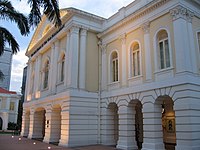Responsible government is a conception of a system of government that embodies the principle of parliamentary accountability, the foundation of the Westminster system of parliamentary democracy. Governments in Westminster democracies are responsible to parliament rather than to the monarch, or, in a colonial context, to the imperial government, and in a republican context, to the president, either in full or in part. If the parliament is bicameral, then the government is responsible first to the parliament's lower house, which is more representative than the upper house, as it usually has more members and they are always directly elected.
Singapore is a parliamentary republic whereby the president of Singapore is the head of state, the prime minister of Singapore is the head of government, and of a Dominant-party system.Executive power is exercised by the Cabinet from the parliament, and to a lesser extent, the president. Cabinet has the general direction and control of the government and is accountable to Parliament. There are three separate branches of government: the legislature, executive and judiciary abiding by the Westminster system. Singapore has been described as being a de facto one-party state.

Bermuda is the oldest British Overseas Territory, and the oldest self-governing British Overseas Territory, and has a great degree of internal autonomy through authority and roles of governance delegated to it by the national Government. Its parliament held its first session in 1620, making it the third-oldest continuous parliament in the world. As part of the British realm, King Charles III is head of state and is represented in Bermuda by a Governor, whom he appoints on the advice of the British Government. The Governor has special responsibilities in four areas: external affairs, defence, internal security, and policing.

The New Zealand Parliament is the unicameral legislature of New Zealand, consisting of the King of New Zealand (King-in-Parliament) and the New Zealand House of Representatives. The King is usually represented by his governor-general. Before 1951, there was an upper chamber, the New Zealand Legislative Council. The New Zealand Parliament was established in 1854 and is one of the oldest continuously functioning legislatures in the world. It has met in Wellington, the capital of New Zealand, since 1865.
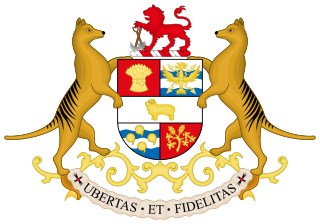
The Parliament of Tasmania is the bicameral legislature of the Australian state of Tasmania. It follows a Westminster-derived parliamentary system and consists of the Governor of Tasmania, the Tasmanian House of Assembly, and Tasmanian Legislative Council. Since 1841, both Houses have met in Parliament House, Hobart. The Parliament of Tasmania first met in 1856.
The Government of Singapore is defined by the Constitution of Singapore to mean the executive branch of the state, the Republic of Singapore, which is made up of the president and the Cabinet. Although the president acts in their personal discretion in the exercise of certain functions as a check on the Cabinet and the Parliament, their role is largely ceremonial. It is the Cabinet, composed of the prime minister and other ministers appointed on their advice by the president, that have the general direction and control of the government. The Cabinet is formed by the political party that gains a simple majority in each general election.

Lim Yew Hock was a Singaporean-born Malaysian politician and diplomat who served as Chief Minister of Singapore between 1956 and 1959. He was the Member of Parliament (MP) for Cairnhill between 1959 and 1963 and previously a Member of the Legislative Council and later Legislative Assembly between 1948 and 1963. He was the 2nd de facto Leader of the Opposition between 1959 and 1963. He and his family elected to take up Malaysian citizenship after Singapore's independence from Malaysia.
The Cabinet of Singapore forms the executive branch of the Government of Singapore together with the President. It is led by the Prime Minister who is the head of government. The prime minister is a Member of Parliament (MP) appointed by the president who in the president's judgment is likely to command the confidence of the majority of the Members of Parliament (MPs). The other Ministers in the Cabinet are Members of Parliament appointed by the president acting in accordance with the advice of the prime minister. Ministers are prohibited from holding any office of profit and from actively engaging in any commercial enterprise.
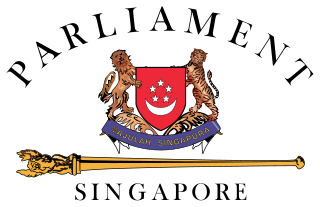
The Parliament of Singapore is the unicameral legislature of the Republic of Singapore, which governs the country alongside the president of Singapore. Largely based upon the Westminster system, the Parliament is made up of Members of Parliament (MPs) who are elected, as well as Non-constituency Members of Parliament (NCMPs) and Nominated Members of Parliament (NMPs) who are appointed. Following the 2020 general election, 93 MPs and two NCMPs from three political parties were elected to the 14th Parliament. Throughout the sitting of Parliament, nine NMPs are usually appointed by the president on a biennial basis.

The Constitution of the Republic of Singapore is the supreme law of Singapore. A written constitution, the text which took effect on 9 August 1965 is derived from the Constitution of the State of Singapore 1963, provisions of the Federal Constitution of Malaysia made applicable to Singapore by the Republic of Singapore Independence Act 1965, and the Republic of Singapore Independence Act itself. The text of the Constitution is one of the legally binding sources of constitutional law in Singapore, the others being judicial interpretations of the Constitution, and certain other statutes. Non-binding sources are influences on constitutional law such as soft law, constitutional conventions, and public international law.

The National Assembly is the sole legislative body of Botswana's unicameral Parliament, of which consists of the President and the National Assembly. The House passes laws, provides ministers to form Cabinet, and supervises the work of government. It is also responsible for adopting the country's budgets. It is advised by the Ntlo ya Dikgosi, a council of tribal chiefs which is not a house of Parliament.

General elections were held in Singapore on 30 May 1959. They were held under the new constitution and were the first in which all 51 seats in the Legislative Assembly were filled by election. This was the first election victory for the People's Action Party (PAP), as they won a landslide victory with 43 seats, and the party has remained in power ever since these elections.

Merdeka is a term in Indonesian and Malay which means "independent" or "free". It is derived from the Sanskrit maharddhika (महर्द्धिक) meaning "rich, prosperous, and powerful". In the Malay archipelago, this term had acquired the meaning of a freed slave. The term is also used in other Indonesian languages.

The New Zealand Constitution Act 1852 was an Act of the Parliament of the United Kingdom that granted self-government to the Colony of New Zealand. It was the second such Act, the previous 1846 Act not having been fully implemented.
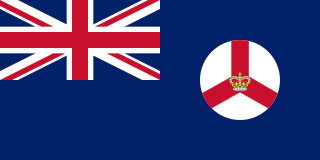
The Colony of Singapore was a British Crown colony that encompassed the island of modern-day Singapore from 1946 to 1958. It was created after the dissolution of the Straits Settlements shortly after Japanese occupation of Singapore ended. The colony eventually gained partial internal self-governance in 1955. It lasted until the establishment of the State of Singapore in 1958.

The self-governance of Singapore was carried out in several stages. Since the founding of Singapore in 1819, Singapore had been under the colonial rule of the United Kingdom. The first local elections on a limited scale for several positions in the government of Singapore started in 1948 following an amendment to the Constitution of Singapore.
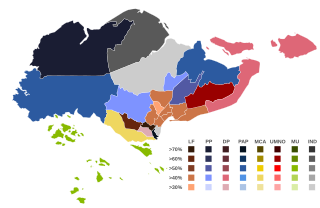
General elections were held in Singapore on 2 April 1955 to elect members to the 25 elected seats in the Legislative Assembly. Nomination day was on 28 February 1955.

The Constitution of Guyana is the highest governing document in the Republic of Guyana. It came into effect on October 6, 1980, replacing the constitution enacted in 1966 upon its independence from the United Kingdom. The current Constitution of Guyana contains 12 chapters that are further divided into 232 articles. It also contains a preamble and an oath. Since its 1980 enactment, it has gone through multiple amendments.

The Malaysia Agreement or the Agreement relating to Malaysia between United Kingdom of Great Britain and Northern Ireland, Federation of Malaya, North Borneo, Sarawak and Singapore (MA63) was the agreement which combined North Borneo, Sarawak, and Singapore with the existing states of the Federation of Malaya, the resulting union being named Malaysia. Singapore was later expelled from Malaysia, becoming an independent state on 9 August 1965.

The Constitution of Sierra Leone is the supreme law governing Sierra Leone and delineates its frame of government. It entered into force on October 1, 1991, following a popular referendum and approval by President Joseph Momoh. It superseded the 1978 Constitution.
